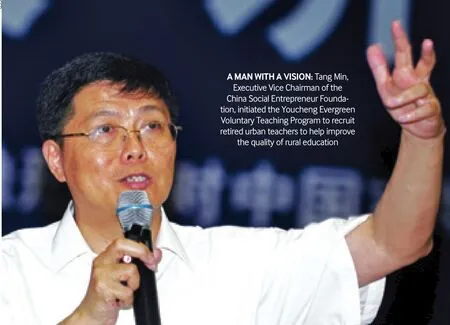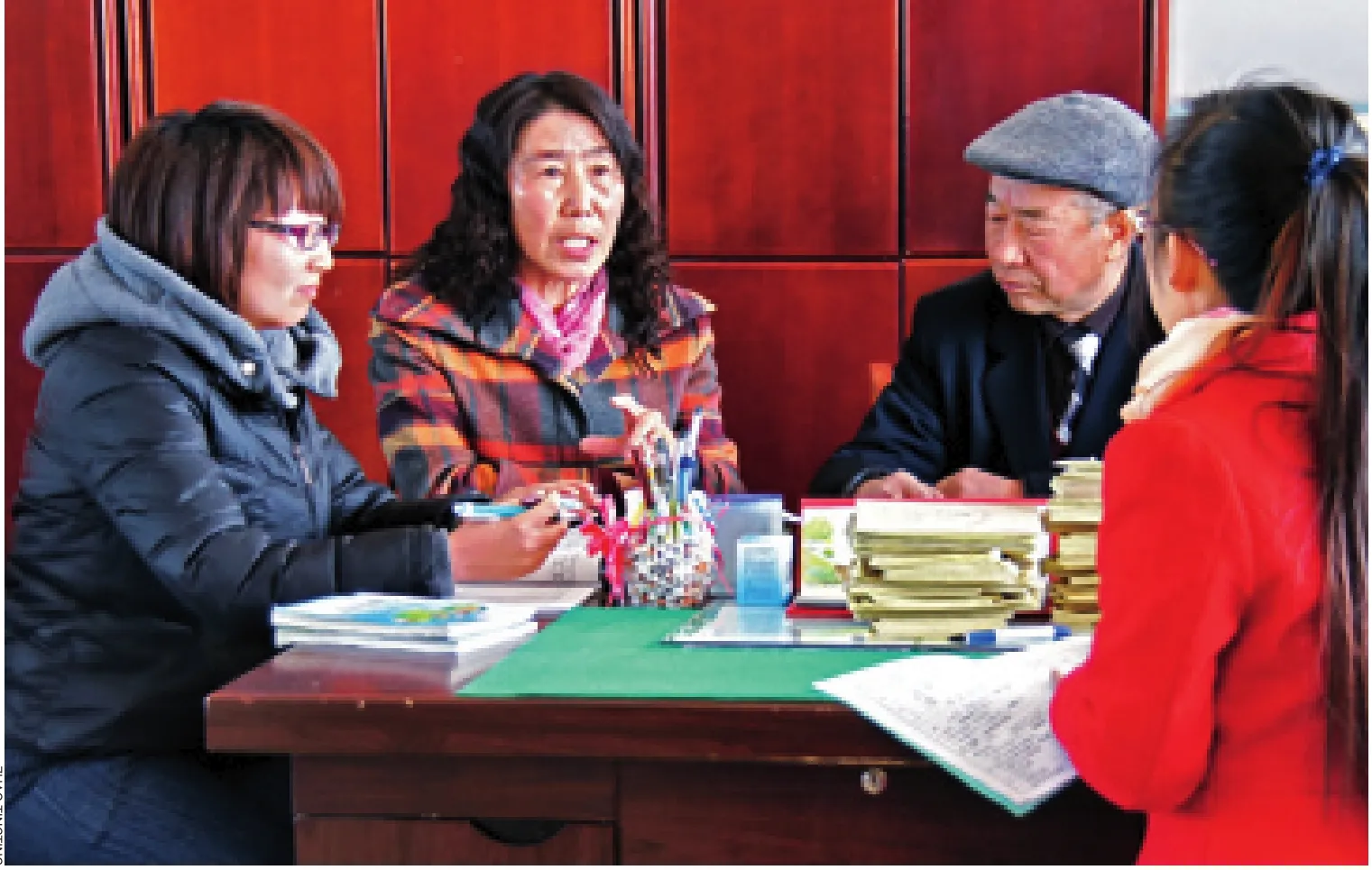Ever Young Teachers
2013-03-05ByLiLi
By Li Li
Ever Young Teachers
By Li Li
Retired urban educators turn low-performing rural schools around through a volunteer program
With its vast mountainous areas and underdeveloped economy, Bama Yao Autonomous County in southwest China’s Guangxi Zhuang Autonomous Region is hardly an ideal venue for young teachers fresh out of university. That’s where Youcheng Evergreen Voluntary Teaching Program comes into play, beckoning urban teachers out of retirement to train a new generation of rural counterparts. Jiagu Junior Middle School in Bama’s Jiagu Township has benefited immensely since the arrival of teachers from the Evergreen program more than two years ago.
The Education Development Research Center under the Ministry of Education evaluated the program in Jiagu Junior Middle School in May 2011, which said that the school achieved a turnaround over the year in terms of number of graduates enrolled in senior high school, student performance and teachers’ skills and knowledge.
Active service
The Evergreen program, aimed at bridging the urban-rural educational gap with a pool of dedicated educators in their golden years, is the brain child of a class reunion of renowned economist Tang Min, who led rural development projects during his seven-year tenure as chief economist of the Asian Development Bank Resident Mission in China. It sends retired educators from urban schools to train teachers and administrators of rural schools and has made great progress in the three years since its inception.

Tang was enrolled in a training program in a teachers college in Nanning, capital city of Guangxi, in the early 1970s. During a college reunion in 2009, Tang found that many of the 200 alumni were at or near retirement age. In China, primary and secondary school teachers retire at 55 for women and 60 for men. “They are experienced educators in good health. But after retirement they have nothing to do but to dance and sing in parks to kill time, it’s a big waste,” Tang told the magazine China Newsweek.
When Tang told his fellow alumni his idea of recruiting retired urban teachers to help rural schools, it received an enthusiastic response. Jin Hongbin is one of Tang’s supporters. “We have deep bond with farmers and the countryside since we all had labored in the farm fields for years in the 1960s and 70s,” said Jin, who before retirement taught at Tiantao Experimental School in Nanning, one of the city’s top schools, and was among the first group of volunteers in the Evergreen program.
The Evergreen program was launched on a trial basis in Jiagu Junior Middle School in March 2010, with 57 retired teachers and administrators from junior middle schools in large cities volunteering.
During the first year of their voluntary service, Jin and his wife Chen Ning, also a retired teacher, traveled to Jiagu Junior Middle School, which has been cited for its unsatisfactory performance more than 10 times.
After conducting a vision screening of all 600 students in the school, Chen immediately went to the principal’s office with the results and called for urgent action. “About 20 percent of students are shortsighted. We need to respond now,” she said. The school immediately changed the lamps in classrooms and enforced a daily routine of eye exercises.
After observing some classes, Lu Ka, a retired English teacher, found that students were learning poor pronunciation from their local English teachers. She asked for help from the Evergreen program’s local office, which sent cassette decks and tapes within days to complement their English textbooks.

HANDS-ON TRAINING: Volunteers Lan Tianhua (second left) and Chen Guokun (second right)from the Youcheng Evergreen Voluntary Teaching Program speak to two young teachers at No.5 Primary School in Helin County, Inner Mongolia Autonomous Region, on March 27
The volunteers consulted with teachers on everything from curriculum and syllabus planning to auditing classes and critically evaluating pedagogic techniques.
“Compared with urban schools, teaching activities in rural schools fail to meet the standards for today’s education. We feel ashamed about the situation as educators. Local teachers said that we should have come earlier,” Jin said.
These veteran teachers also trained teachers and administrators on handling student behavioral problems, such as sleeping during class sessions and skipping classes to play online games.
Local students and teachers were also moved by the passion and commitment of these volunteers, who were often the first ones to arrive to school each morning.
Volunteers derive a sense of self-fulfillment from the program. “The Evergreen program gives me back the wonderful days of being surrounded by teachers and students. Children make me feel young again,” Jin wrote in his journal.
China’s vast development gap between urban and rural areas clearly manifests itself in the education sector. While schools in large cities are staffed with qualified teachers with university degrees and plenty of training opportunities, schools in the remote countryside often find it hard to attract qualified staff to areas with tough living conditions and limited opportunities for advancement.
Due to the lack of money to employ sufficient numbers of licensed teachers, rural areas once hired unlicensed “substitute teachers” to meet dire shortfalls before the Ministry of Education banned the practice in 2010. Even after the government’s years of investment in overhauling rural educational facilities, the shortage of qualified teachers still greatly hinders progress.
China has many volunteer programs sending teachers to rural schools, but some fall short in professional qualifications, and even experienced volunteers do not always make lasting changes before departing.
Yang Yinfu, an education evaluation expert, told the newspaper21st Century Business Heraldthat the Evergreen program could be adapted to other areas in China through non-governmental organizations as limited financial resources are needed.
The program was launched in two primary schools and one junior middle school in Hexian County, north China’s Inner Mongolia Autonomous Region, in September 2011. Besides sending veteran educators to tutor young teachers, the program has also financed field study trips for rural teachers to go to three top-rated urban schools in Hohhot, the regional capital, where they learned advanced educational concepts first-hand.
According to the program’s office, between 2011 and 2012 the program recruited 2,118 volunteers, who provided services at 33 schools in 16 counties in seven provinces and autonomous regions. It has a plan to help 500 schools in povertystricken areas in 100 counties within the next three to five years.
Untapped resources
Under the program, volunteers have to stay at the school they consult for at least three weeks a time to offer one-on-one coaching to young teachers and provide suggestions on school administration in general. The program subsidizes volunteers’ travel and living expenses. After Tang became executive vice chairman of the China Social Entrepreneur Foundation in December 2012, the program has been financed by the nonprofit organization engaged in anti-poverty efforts.
Shortly after being appointed to the Counselors’ Office of the State Council in 2011, Tang expressed his belief that China’s retired teachers, engineers and medical workers represent a talent pool waiting to be explored.
As one of his first duties as a consultant to China’s cabinet, Tang was invited to give suggestions on a government report before its submission to the annual National People’s Congress in March 2011. Tang told then Premier Wen Jiabao about the Evergreen program in Guangxi and suggested launching similar programs elsewhere to take advantage of the expertise of retired professionals, winning Wen’s recognition and praise.
Tang toldChina Newsweekthat he was confident about enlarging the brand by including retired professionals from other fields.
“By organizing such programs, we could further narrow the gap between urban and rural areas. We not only need to inject money in rural development, but also tap the potential of hundreds of thousands of qualified personnel. Retirees have the expertise as well as the network to mobilize other resources,” Tang said.
lili@bjreview.com
